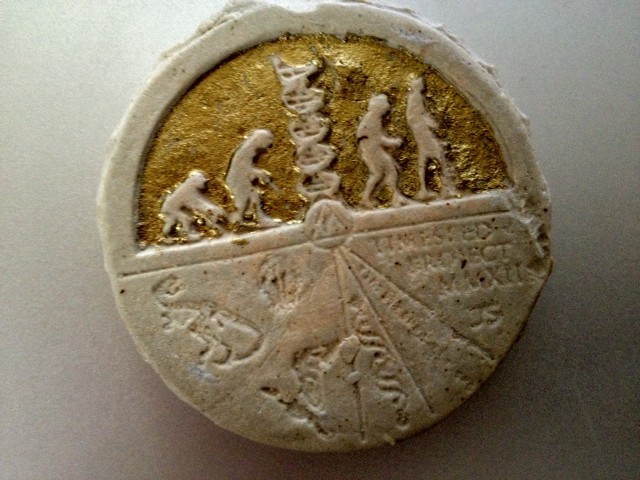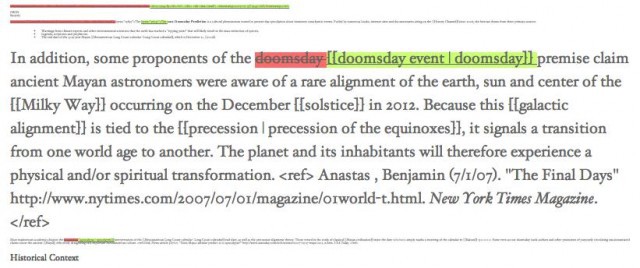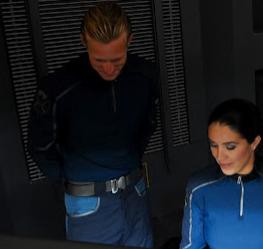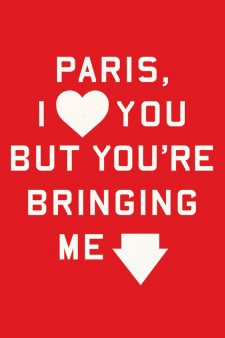Procedure Unnerving
As a service to the gentlemen who peruse this site, I would like to strongly warn you against surveying this piece on penile enlargement surgery unless you have some compelling need to keep your legs crossed for the rest of the day, in which case by all means go ahead. The rest of you have been warned.
Playwright Mediocre
Oh, thank God. I thought I was the only one who felt this way about Arthur Miller.
The Kids Are Deranged: The Best of NYU's ITP Student Show

Tonight is the second night of the NYU Interactive Telecommunications Program spring show, with thesis projects and schemes and fun things. It’s sheer chaos, and you can stop by tonight from 4 to 8 p.m. if you want to see some good old fashioned wackiness.
A few of the student projects really stood out for me as art objects or as great thinking or excellent applied programming or as just plain fun. There were probably a lot of great things that I didn’t “get” or didn’t appreciate or just missed, so human error applies here.
• Google Booth is a small constructed room. There’s a slot on the outside; people can write down their Google searches and stick them in. If you’re on the inside, you get the requests, and you have some reference books to use. “CAN I GOOGLE FOR THEIR ANSWER?” I asked project co-creator Stefanie Kleinman. “NO!” she said. It was really stressful but super gratifying to answer questions and shove them back out through the “results” slot to the waiting people. I could have stayed in there for the rest of my life. I have no idea how close I came to getting the answer to “how big is China in square feet” right but why did someone want to know anyway? They were just messing with me! Me and Stefanie talked about the pleasures of Mind-Googling for a while. It really slowed everything down quite nicely.
• Kioku is basically ready for purchase by Google or Facebook. It sorts your photos by contrast, geography, “likes,” time, space, number of subjects, color and more.
• Another project by someone that you should hire immediately is Wiki-History. It’s just a one-page demo now, but Kate Tibbets is writing the code to interface with all of Wikipedia, to show a visual timeline of a page’s edit history.

• The Descriptive Camera is awesome. (The camera uploads a jpg to a human source that describes the photo in text and then the camera prints that description out. Love you!)
• Obviously, Natalie Be’er’s Fostr.org solves a huge missing link in the animal care spectrum. Foster care for animals has never had central organization before, and was all done agency-by-agency. Ta da. Fixed. So wonderful to see someone identify a missing component of the Internet and step right up.
• Risky Lisky is an absolutely bonkers and useless and wonderful game: it turns any email list into a fantasy sports team — but only you know it. It’s impossible to explain, but they do a pretty good job. This is sort of the opposite of annoying app gamification trends. It’s a way to make fun out of the awful.
• What’s notable about a show like this, of course, is that after a while you start thinking: man, when the lights go out for good, none of this stuff is going to be of much use. Your flat screen is going to become a dining table when there’s no more power plants. That’s why I loved Jackson Taylor Snellings’ ridiculous project, to which I award my honorary Best In Show Award. He is leaving “ultra-durable” objects — ceramic coins — around the globe, so that when we’ve all gone poof, there’ll maybe be at least some potentially legible markers of our existence. The coins have markings that’ll prove that we at least knew where we were located in our solar system, that we knew about evolution, and that we knew about math and society. They’re a fun play on narcissism too. He’s not just leaving something for the future, he’s leaving a record of himself — including some small attempts at leaving genetic material embedded in the coins.
Why So Many People Work at the 'New Yorker'
“For a while, we tried faithfully to reproduce the backward ‘R’ in Toys ‘ᴙ’ Us, but it went rogue and ran loose on the page every time we turned our back.”
— — And that’s why the New Yorker can’t have nice things.
"I have mixed feelings about the SHIELD uniforms"

“I have mixed feelings about the SHIELD uniforms as we see them in The Avengers. The fitted jumpsuits/trousers-shirt combos worn by most of the agents onboard the Helicarrier don’t look too bad, but I’m a little confused as to why they’re wearing them. They look like field uniforms, but we already know that field agents either wear normal clothes like the suit-wearing Coulson, or out-and-out military gear (like the soldiers sent to pick up Bruce Banner and guard Loki when he’s on the Helicarrier). Also, the people on the bridge of the Helicarrier are analysts and pilots, doing what essentially amounts to desk work. Although Hill and Fury do both carry sidearms, the fact that female SHIELD agents have the option of wearing a skirt and heels indicates to me that the agents on the bridge of the Helicarrier are not expected to be battle-ready.”
— Did you know there’s a website called “Hello, Tailor” (heh) that is midway on a million-part series devoted to Avengers costumes
? They have a lot to say about Agent Coulson’s Dolce & Gabbana suit.
"Now you have a chance to buy a chicken nugget shaped like a cowboy boot"

“Sgt. Dennis Coleman bought the nugget Sunday at the Dion’s Quikmart at 63rd Street and U.S. 1 in Marathon. He says ‘I was about to start eating when I noticed one of the nuggets resembled a cowboy boot.’ So his first thought was preserving the nugget and putting it on eBay. Minimum bid is $5.”
— Thank God we have newspapers.
Nine Paris Apartments In Eleven Hours
by Rosecrans Baldwin

In 2007, Rosecrans Baldwin was offered a job with an ad agency in Paris, and he and his wife made the move to France from Brooklyn. In this excerpt from Paris, I Love You But You’re Bringing Me Down, his new (and very funny) memoir about the experience, he goes on a search for an apartment.
Three weeks later, I returned to Paris to find an apartment. The agency provided me with an HR representative and a real-estate agent to show me around. Extremely generous of them, I thought. We saw eleven apartments in nine hours. The agent was serious about her business. She rarely smiled, driving us in her small Peugeot. The HR rep was friendlier, with peachy skin and a high, screwy laugh. All day long, we crisscrossed the city, and I could barely keep track of the neighborhoods, the arrondissements.
Back in Brooklyn, I’d spent hours reviewing apartment listings on websites for expats. The descriptions were dreamy and confusing:
Exclusive EXCLUSIVITY: Magnificent studio. Totally re-newed, last floor, sight loosened on Paris. Beautiful room to be lived, with U.S.-equipped cooking (oven, patches, refrigerator). Public prosecutor’s department. Very bril- liant: several windows. SdE with wc. Close any conveniences. Immediate availability. To seize!
The first apartment was above a farmer’s market near the Sorbonne, on the Left Bank. The location was Paris Magnificent. Many cheesemongers nearby, booksellers, and tabacs. It was the area known as the home of Sartre and Hemingway, the old boys you saw on postcards for €2.25. We waited for ten minutes to be let into the building, and the agent checked email on her smartphone. A lot, I thought, had happened since the days of Hemingway. Luke Skywalker had happened. Supermarkets happened. Hip-hop happened and Joan Didion happened. Email happened. More relevant to Paris, there was 1968 and Les Halles razed, there were Mitterand’s grand projets and Serge Gainsbourg buried in Montparnasse.
The landlord arrived and we climbed upstairs, where the apartment did not reflect the Left Bank’s glory. It reflected us. It was a 1970s party pit and the owner had gone in for mirroring. Walls in the bedroom were mirrored. The headboard was mirrored and cabinets were mirrored. The breakfast bar would be good for doing cocaine.
“Do you like it?” the agent asked in French.
“Ce n’est pas terrible,” I said, focusing on my annunciation.
She said, “What would you prefer to see?”
I glanced at a pair of chairs upholstered in red leopard. I did not want to seize them.
“S’il vous plait,” I said slowly, “moins des chaises des animaux?
“Merci beaucoup,” I added.
The next two apartments were under construction. A fourth apartment, north of the Luxembourg Gardens on a demure, quintessential Parisian street, was all green. Green walls, green drapes, green furniture. Kitchen appliances in avocado. The only thing that wasn’t green (the doorknobs were green) was in the bedroom, behind a chair: a large trompe l’oeil painting of women’s lingerie hanging on knobs.
We were in a Folies Bergère dressing room.
“Not bad,” said the agent. The HR representative agreed and went close to admire the work. The agent saw my face. “Wait, we’re in Paris,” she said. “It is creative, the capital of creative. Americans love this.”
“Je suis d’accord,” I said. “… Peut-être moins créatif?”
Before we moved on, the HR rep said, “We thought you were creative.”
Rue de Harlay. Sauf Accès Parc. Interdit. Honestly, even the street signs were nourishment; I was in a mood to drive around Paris all day long. First we went for lunch on Ile de la Cité, one of the islands on the Seine, where Paris had begun. The agent took us to Place Dauphine, behind Pont Neuf. We occupied a sidewalk table. The sun was so close we could have plucked it.
Just unbelievable, the idea I’d be living there soon.
The women required two minutes to confirm they would order different plates of charcuterie, then came wine selection:
“You think a Sancerre?”
“Oh no, not a Sancerre.”
“No. Stupid of me.”
“What about rosé?”
“But a good rosé.”
“Yes, yes, a good rosé, it would be perfect. From where, though?”
“From Aix?”
“Ah, Aix . . .”
The next apartment, a loft nearby, was across the street from La Conciergerie, a fortress from the Middle Ages that once had been the “antechamber to the guillotine.” The stairs we climbed were centuries old, tacky with black mold.
“Ah, the charm,” the agent sighed. She paused on a landing for the HR representative to agree. The HR rep nodded, breathless from the climb.
Inside, I shielded my eyes, the loft was so bright. The apartment was wild. Windows overlooking Notre Dame’s gargoyles, showing the Seine flowing east and west. Sight loosened on Paris. The bathroom was all marble; it had a bathtub with a view and river breezes. And the rent, the agent said, was nothing.
Unfortunately, the apartment was about the size of the agent’s car.
“Yes, it’s too small,” she said, patrolling the room in about four steps. “You will hit your head. And you are bringing your wife. You will need space.”
The agent stopped dead next to the bathtub. Both of us took in the view of Notre Dame’s spires. The agent tugged up her suede boots and said she had an idea.
“Listen,” she confided, “now suppose you want to have an affair. Men in Paris… Just remember this place. It would be perfect for that.”
The HR woman said, “The size would be just right.”
She was sitting on the bed, patting the duvet. She smiled at me, blinked behind her glasses, and laughed. She said in English, “Nice bed, hey?”
Rosecrans Baldwin’s debut novel, You Lost Me There, was named one of NPR’s Best Books of 2010, a New York Times Book Review Editors’ Choice, and a Time and Entertainment Weekly best book of summer 2010. He is a cofounder of The Morning News.
I'm Not Drunk, I'm IMPROVING MY DIGESTIVE HEALTH!
“According to research, red wine may improve digestive health.”
Science Is Going To Ruin Drinking

Everybody’s trying to make anti-drinking pills! Or, at least, pills that drain the pleasure out of drinking. They are predicated on the idea of reducing harm to serious drinkers by reducing the potency of alcohol. Look, we joke a lot about alcoholism on this site, because it’s much more simple to dismiss the whole thing with mockery rather than be forced to confront what is in actuality a remarkably crippling addiction, one whose physical and mental effects we are already beginning to notice in our own physiology, and also the persistent sense of shame and guilt over our inability to reduce the amount we consume no matter how many times we promise ourselves and others that we will do so, and the toll that our behavior, both drunk and sober — but always colored by having been or being about to become drunk — has taken on so many of our relationships, and the way we’ve hurt so many people who love us an easy laugh, but we guess if this helps out a few people who need it, okay. Anyway, it’s 5 o’clock somewhere! We’re off for a quick one.
Photo by ejwhite, via Shutterstock
